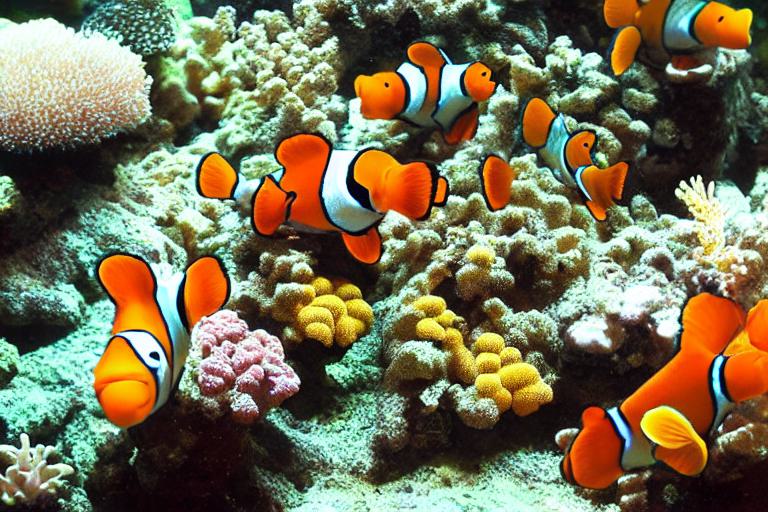Clownfish are a popular choice for saltwater aquariums because of their vibrant colors and relatively low maintenance. Many saltwater aquarium enthusiasts would like to add hammer coral to their tanks, but are unsure if clownfish will host the coral. In this article, we will explore whether or not clownfish are compatible with hammer coral in a saltwater aquarium.
Encouraging Clownfish to Host Hammer Coral
They are relatively easy to care for and are very colorful. Clownfish are one of the most popular fish in the saltwater aquarium trade. Many people choose to keep clownfish because they are interested in the symbiotic relationship between clownfish and anemones.
It is a popular coral for saltwater aquariums because it is relatively easy to care for and is very beautiful. Clownfish will often host in anemones in the wild. However, they can also be encouraged to host in other types of corals, such as hammer coral. Hammer coral is a large polyp coral that is found in a wide range of colors.
There are a few things that you can do to encourage your clownfish to host in hammer coral. First, make sure that the hammer coral is healthy and well-established in your aquarium. Clownfish are more likely to host in corals that are healthy and have a strong foothold in the aquarium.
Second, provide plenty of hiding places for your clownfish. Clownfish feel more secure when they have places to hide, and this will make them more likely to host in the hammer coral.
It may take some time for your clownfish to get used to the hammer coral and decide to host in it. Finally, be patient. However, if you provide the right conditions, eventually your clownfish will host in the hammer coral and you will have a beautiful and unique aquarium.
Suggestions for Encouraging Clownfish to Host Hammer Coral
They are relatively easy to care for and are very colorful. Clownfish are one of the most popular fish in the saltwater aquarium trade. Many people choose to keep clownfish because they are interested in keeping a saltwater aquarium but do not want to deal with the hassle of caring for coral.
One of the most popular corals in the saltwater aquarium trade is the hammer coral. Hammer coral is a type of large polyp stony coral. It is a very beautiful coral and can add a lot of color and interest to an aquarium.
Clownfish will often host anemones in the wild. Many aquarists believe that clownfish will also host hammer coral in their aquariums. Anemones provide clownfish with protection from predators and also offer them a place to lay their eggs.
Clownfish feel more secure when they have plenty of places to hide and this will make them more likely to host hammer coral. First, you should provide your clownfish with plenty of hiding places. There are a few things that you can do to encourage your clownfish to host hammer coral in your aquarium. This can be accomplished by adding live rock and coral to your aquarium.
You should also make sure that your clownfish have plenty of room to swim. Another way to encourage your clownfish to host hammer coral is to feed them well. A crowded aquarium is not a good environment for clownfish and they are less likely to host hammer coral in a crowded aquarium. A healthy diet will make your clownfish more likely to host hammer coral.
If you follow these suggestions, you should be able to encourage your clownfish to host hammer coral in your aquarium. Clownfish are relatively easy to care for and are a great addition to any saltwater aquarium. Hammer coral is a beautiful coral and can add a lot of color and interest to your aquarium.
Clownfish Hosting Behavior
Clownfish are known for their unique hosting behavior, in which they live among the tentacles of certain sea anemones. This symbiotic relationship is beneficial for both the clownfish and the anemone, as the clownfish is protected from predators by the anemone’s stinging tentacles, and the anemone receives food in the form of the clownfish’s waste.
The clownfish will often swim in and out of the hammer coral’s tentacles, using them as a safe haven from predators. While clownfish will host a variety of different anemones, they have a preference for the hammer coral. The hammer coral is a large anemone with long, flowing tentacles that provide ample shelter for the clownfish.
This close relationship between clownfish and hammer coral is a fascinating example of symbiosis in the natural world. It is also a reminder of the importance of creating a diverse and balanced ecosystem in our saltwater aquariums, as this will provide the best possible environment for all of the inhabitants.

Signs of Hosting Issues
Another sign is if the clownfish is not eating as much as it used to or if it seems to be losing weight. There are a few signs that your clownfish may be having hosting issues. If you notice any of these signs, it is important to take a closer look at your clownfish and see if there are any other signs of stress. If you think your clownfish is having hosting issues, it is important to seek out professional help so that you can get your clownfish the help it needs. One sign is if the clownfish is not swimming around as much as usual or if it seems to be hiding more than normal.
Sources
One of the most important things to consider when setting up a saltwater aquarium is what type of fish you want to put in it. One popular choice is the clownfish, which is known for its ability to host anemones. But did you know that clownfish can also host hammer coral?
They need a lot of care and attention to thrive, and if you’re not prepared to give them that, they will quickly die. This is important to consider because hammer coral is a lot more delicate than anemones.
They come in a variety of colors and can add a lot of visual interest to your tank. That being said, if you are prepared to give them the care they need, they can make a beautiful addition to your aquarium.
If you’re thinking about adding hammer coral to your saltwater aquarium, be sure to do your research first. With a little bit of knowledge and preparation, you can have a beautiful and thriving aquarium. Make sure you know what you’re getting into and that you’re prepared to give them the care they need.
Frequently Asked Questions
1. What is a clownfish?
A clownfish is a small, brightly-colored fish that is found in warm waters around the world. Clownfish are popular in saltwater aquariums because of their vibrant colors and interesting behavior.
2. What is a hammer coral?
A hammer coral is a type of large coral that is found in warm, saltwater environments. Hammer coral can grow to be over a foot in diameter and has a large, round “head” with many small “branches” extending from it.
3. Can clownfish live in a saltwater aquarium with hammer coral?
Yes, clownfish can live in a saltwater aquarium with hammer coral. Clownfish are often found near coral in the wild, and they will not harm the coral in your aquarium.
Clownfish eat small planktonic organisms, such as copepods and amphipods. They will also eat algae and detritus.
5. How do I care for clownfish?
Caring for clownfish is relatively easy. They are hardy fish and can tolerate a wide range of water conditions. It is important to provide them with a well-oxygenated aquarium with plenty of hiding places. Live rock and coral are good choices for providing hiding places and oxygenating the water.
6. How do I care for hammer coral?
Caring for hammer coral is similar to caring for other types of coral. Hammer coral needs a well-oxygenated aquarium with plenty of light and a stable water temperature. It is important to avoid putting the coral in an area with strong water flow, as this can damage the coral.
7. What are the benefits of keeping clownfish and hammer coral together in an aquarium?
Keeping clownfish and hammer coral together in an aquarium can provide a beautiful and interesting display. The clownfish will add color and movement to the aquarium, while the hammer coral will provide a striking center piece.
8. Are there any risks associated with keeping clownfish and hammer coral together in an aquarium?
There are a few risks associated with keeping clownfish and hammer coral together in an aquarium. The clownfish may nibble on the coral, which can damage it. It is also important to make sure that the water conditions in the aquarium are suitable for both the clownfish and the coral.
9. What should I do if my clownfish starts nibbling on my hammer coral?
If your clownfish starts nibbling on your hammer coral, you can try moving the coral to a different location in the aquarium. You can also try feeding the clownfish more often, as this may help to deter them from nibbling on the coral.
10. Can I keep more than one clownfish in my aquarium?
Yes, you can keep more than one clownfish in your aquarium. However, it is important to provide them with plenty of hiding places, as they can be aggressive towards each other.
Final thoughts
Clownfish and hammer coral can coexist in a saltwater aquarium if the tank is large enough and the water quality is well-maintained. The clownfish will provide the hammer coral with a place to hide and the coral will help to filter the water. Both of these creatures are beautiful additions to any aquarium and can provide hours of enjoyment for the owner.
